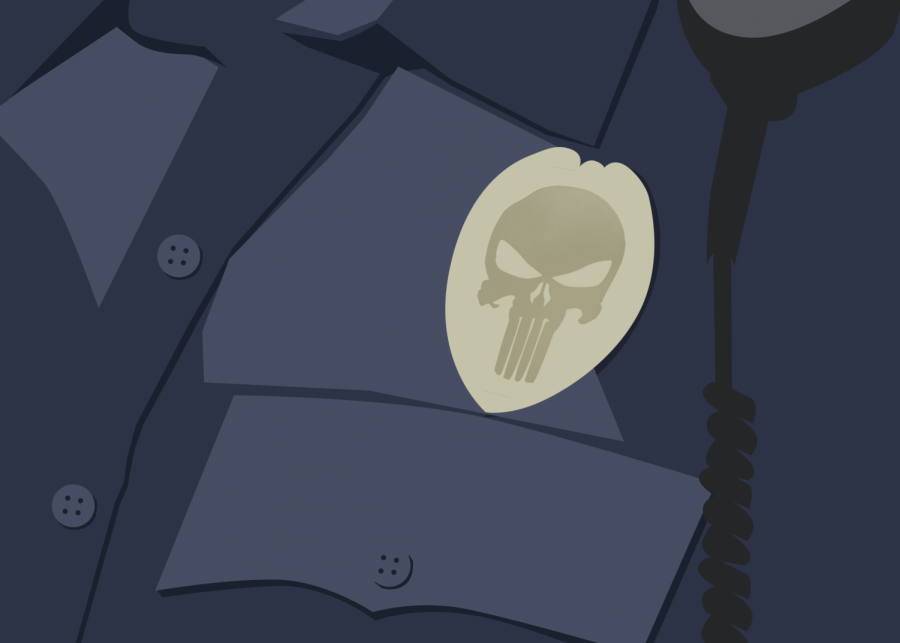Police Have Missed the Point of The Punisher
The symbol of the Punisher often used for Blue Lives Matter.
The Punisher, an iconic anti-hero of the Marvel Universe, has long been an unofficial symbol of the United States military. However, in more recent years, it has been adopted by the Blue Lives Matter movement as a rallying symbol in response to the rise of supposedly anti-police rhetoric.
First introduced in a 1974 Spider-Man comic as a recurring antagonist, the Punisher is the vigilante persona of Frank Castle. Castle, a Marine veteran of the Vietnam War, became the Punisher after witnessing the murder of his family for being in the wrong place at the wrong time and subsequently receiving no form of justice. The most important aspect of the Punisher as a character and what cements his identity as an anti-hero rather than just another gallant do-gooder lies in the idea that he has no moral qualms with violent murder as a form of justice. Rather, he wants to avenge the innocent and punish the guilty at any cost.
Like every comic book character, Castle’s character has evolved over time and with the advent of the wars in Iraq and Afghanistan, he became increasingly popular as a symbol among service members. A rather famous example of this was when the unit of Chris Kyle, the American Sniper, started calling themselves “the Punishers” and using the iconic skull emblem from the comics to mark their gear and territory. In 2014, the symbol made its way beyond the military with the creation of Blue Lives Matter. As tensions between the American public and police officers began to rise, supporters of police adopted the Punisher skull iconography as a sign of solidarity. The skull can often be seen being combined with the Thin Blue Line flag, a black and white American flag with one blue stripe meant to represent support of the police.
Over the last few years, the police fanbase of the Punisher has only grown. In an interview with Vulture, law enforcement officer Jesse Murrieta expressed what seems to be a common sentiment among police officers who are Punisher fans: “Frank Castle does to bad guys and girls what we sometimes wish we could legally do, Castle doesn’t see shades of grey, which, unfortunately, the American justice system is littered with and which tends to slow down and sometimes even hinder victims of crime from getting the justice they deserve.”
In that exact sentiment lies the issue. The Punisher is a criminal; he is not intended to be a good guy and what he does should not be a fantasy of the police, whose job is to uphold the law and protect American citizens. It is not the job of law enforcement officers to dispense justice to anyone and it has never been. There’s a reason that the justice system sees shades of gray (whether Jesse Murrieta likes it or not) and even with a more nuanced view, widespread issues of discrimination and prejudice still run rampant. In 2017, after public outcry forced a police chief in Kentucky to remove large Punisher skull decals from eight squad cars, io9’s Beth Elderkin gave her two-cents on the subject: “The job of a police officer is to uphold the law, to serve and protect. The Punisher kills people he feels deserve it. There’s a big, dangerous difference between these two things — and there should be.”
More to the point, the character himself is inherently anti-police. The whole reason that Frank Castle took on his vigilante role was that he felt left behind by the system. In an interview with SyfyWire, the character’s creator Gerry Conway said as much: “The vigilante anti-hero is fundamentally a critique of the justice system, an example of social failure, so when cops put Punisher skulls on their cars or members of the military wear Punisher skull patches, they’re basically [siding] with an enemy of the system. They are embracing an outlaw mentality. Whether you think the Punisher is justified or not, whether you admire his code of ethics, he is an outlaw. He is a criminal. Police should not be embracing a criminal as their symbol.”
The current writer for the comics seems to agree because, in July of 2019, Marvel published Punisher #13, which addressed the rise of police Punisher fans. In the comic, Frank Castle becomes cornered by two cops who, after realizing who he is, proceed to lower their weapons and tell him how much they look up to him. Castle, being somewhat perturbed, responds by giving them a beatdown and saying, “I’ll only say this once: We’re not the same. You took an oath to uphold the law. You help people. I gave that up a long time ago. You don’t do what I do. Nobody does. You boys need a role model? His name is Captain America and he’d be happy to have you.”
Unfortunately, that very direct callout of misguided fans fell on deaf ears. Even though he is so clearly meant to critique the failings of the justice system, the Punisher still gains a plethora of fans who have walked headfirst into the point and even managed to miss it. It’s a painfully common theme. Representations of disastrously violent and unhinged men in entertainment media have a long history of acquiring fan bases that disregard the fundamental critiques evident in the media itself entirely. A popular example of this is seen in fans of the movie Fight Club. The entire point of the film is to critique the “alpha male” persona, yet many male fans have managed to miss the point by such a large margin that they think it’s meant to praise that lifestyle. The same thing has happened with the Punisher. A character who was originally intended to be a critique of the justice system has been wholly embraced by it.
The conversation around the use of the Punisher skull as a rallying sign for police unity and Blue Lives Matter is specifically important right now as tensions between police and the American public have escalated to the point where the state is using incredible amounts of violence to suppress protests against state-sanctioned violence. It makes no sense than that police, who are supposed to uphold law and order, would idolize a character who’s entire purpose revolves around being an outlaw. Perhaps it shouldn’t be so surprising; police officers have a history of using unnecessary violence against innocents. Regardless, fans of the Punisher who idolize police officers should reread the comics because they’ve sorely missed the point.

Amaya Brooks is a senior this year at Boulder High and a new addition to The Owl’s staff. She recently took an interest in journalism and hopes to explore the world of reporting more deeply this year. She looks forward to the new opportunities, skills and ideas that working as a staff writer on The Owl will give her and is excited to watch how the publication will adapt to the new world of masks and social distancing. Although a very opinionated person, she has no strong preference for green or purple grapes. Her only condition in regards to the fruit is that they aren’t mushy. Beyond that, she can often be found writing in her journal, attempting a new skill (this summer it was skateboarding),...




Annika Bjorklund • Oct 6, 2021 at 2:03 pm
I myself am not a big Marvel fan but I appreciate how they use their platform to speak out on important topics. Your piece really helped me understand the nuances of what they are doing and I find it rather ironic that blue lives matter protestors are using a character whho represents the opposite of their goals to promote their own opinion.
Jason • Jul 27, 2023 at 4:18 pm
Really wish I was more surprised to find out that cops can’t read….
Gena Ryan • Apr 30, 2021 at 5:29 pm
What a great article! Truly insightful writing – I was surprised to see the author/journalist was in high school! I look forward to many more articles and seeing great things from Amaya in the future!
Hannah Cohen • Oct 2, 2020 at 2:41 pm
Such an interesting article– people always see what they want to see (even if that’s just the name of a character).